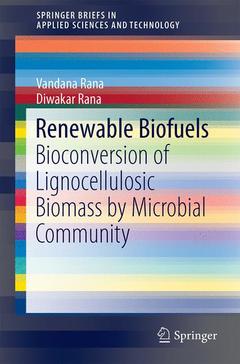Description
Renewable Biofuels, 1st ed. 2017
Bioconversion of Lignocellulosic Biomass by Microbial Community
SpringerBriefs in Applied Sciences and Technology Series
Authors: Rana Vandana, Rana Diwakar
Language: English
Subjects for Renewable Biofuels:
52.74 €
In Print (Delivery period: 15 days).
Add to cartSupport: Print on demand
Description
/li>Contents
/li>Biography
/li>Comment
/li>
Introduction.- Lignocellulose structure.- Enzymatic hydrolysis of lignocellulose.- Biodegradation by microorganisms.- Lignocellulolytic enzymes: Potential for biorefinery.- Conclusions.
Vandana Rana is a Senior Analyst at Black and Veatch Corporation in Kansas City, Missouri.
Diwakar Rana is a Research Investigator at E.I.du Pont de Nemours and Company in Overland Park, Kansas.
These books may interest you

Lignocellulose-Based Bioproducts 105.49 €

Lignocellulose-Based Bioproducts 105.49 €


